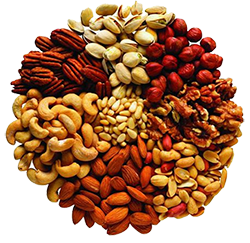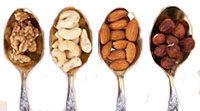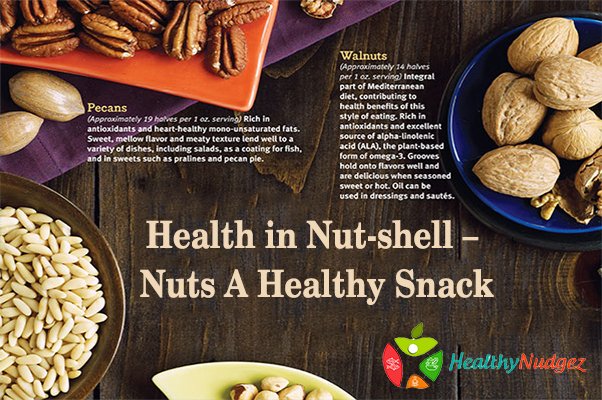Health in Nut-shell – Nuts A Healthy Snack
Nuts are nutrient dense fruits with a hard-outer covering, are tasty and convenient all-time favourites packed with loads of health benefits. Nuts are rich sources of un-saturated fats, high in good quality vegetable proteins, fiber, minerals, tocopherols, phytosterols, and phenolic compounds and are low in carbohydrates. They are not as sweet as other fruits, but by virtue of their unique nutritive composition, confer many health benefits. Epidemiologic studies have associated nut consumption with a reduced incidence of coronary heart disease, gallstones and diabetes. Some studies also suggest that nut consumption has a beneficial effect on hypertension, cancer and inflammation.
Nuts have a cholesterol lowering effect and have a beneficial effect on visceral adiposity and chronic diseases such as obesity and diabetes. Although nuts are a rich source of fats, still regular consumption of nuts is not associated with weight gain.
Nuts can be eaten as snacks, desserts or part of a meal, eaten whole (fresh or roasted), in spreads (peanut butter, almond paste), as oils or hidden in commercial products, mixed dishes, sauces, pastries, ice creams and baked goods.
Nutritive value of Nuts:
One ounce (28.4 gm) of mixed nuts will provide:
- Calories: 160 K cals
- Proteins: 6 gm
- Fats: 15 gm (saturated: 2.5 gm, Polyunsaturated: 4.1gm, Monounsaturated: 8gm)
- Trans fat: 0
- Cholesterol: 0
- Carbohydrate: 6 gm
- Dietary Fiber: 2gm
In addition, they are also a good source of iron, calcium, vitamin B6 and B9 (folic acid). They are also a rich source of copper, manganese and good source of selenium. Apart from this their Glycemic load is 0 (zero) meaning nuts consumption does not lead to an increase in blood sugar levels. The sodium content of nuts is almost undetectable to very low in most nuts.
 The unique combination of macronutrients, micronutrients and phytochemicals, in nuts has shown to be beneficial in many health conditions and contribute to reduce the risk of CHD and related metabolic disturbances. Nuts also have an optimal nutritional density with respect to healthy minerals, such as calcium, magnesium, and potassium. A high intake of calcium, magnesium and potassium, together with a low sodium intake, is associated with protection against bone demineralization, arterial hypertension, insulin resistance, and overall cardiovascular risk. Obviously, the advantage of the low sodium content of nuts is lost if they are consumed as a salted product.
The unique combination of macronutrients, micronutrients and phytochemicals, in nuts has shown to be beneficial in many health conditions and contribute to reduce the risk of CHD and related metabolic disturbances. Nuts also have an optimal nutritional density with respect to healthy minerals, such as calcium, magnesium, and potassium. A high intake of calcium, magnesium and potassium, together with a low sodium intake, is associated with protection against bone demineralization, arterial hypertension, insulin resistance, and overall cardiovascular risk. Obviously, the advantage of the low sodium content of nuts is lost if they are consumed as a salted product.
whole raw, unpeeled and otherwise unprocessed nuts may be considered as natural health capsules, where the whole is always better than the parts.
A few health benefits of nuts are:
- They have shown to lower the risk of cardiovascular disease risk, show a cardioprotective effect by reducing formation atherosclerotic lesions.
- Protect the bones against demineralization, improving overall bone health, reducing risk of osteoporosis.
- Reduce arterial hypertension and improve blood pressure.
- Reduce insulin resistance and risk of type 2 Diabetes Mellitus.
- Lower total cholesterol and triglyceride levels, also reduce chances of gall stone formation.
- Help to reduce weight, in-spite of their high fat content, and are associated with decreased body mass index (BMI).
- Protect the body against oxidative damage by removing free radicals from the body.
- Reduce inflammation thereby, defending the body from injury, as well as bacteria and other potentially harmful pathogens.
- They are a rich source of fiber which act as prebiotics and help improve gut health.
 In view of all the above benefits it will be advisable to replace unhealthy fatty snacks such as chips and crackers with a handful of nuts. About 30 gms or 1/4th cup of mixed, unsalted, unprocessed nut should be included in the daily diet for best results. They can be eaten as such, mixed with dried fruits, breakfast cereals, oil seeds, milk or yogurt to maximize taste.
In view of all the above benefits it will be advisable to replace unhealthy fatty snacks such as chips and crackers with a handful of nuts. About 30 gms or 1/4th cup of mixed, unsalted, unprocessed nut should be included in the daily diet for best results. They can be eaten as such, mixed with dried fruits, breakfast cereals, oil seeds, milk or yogurt to maximize taste.
Free Consultation with Top : Nutritionist near me

